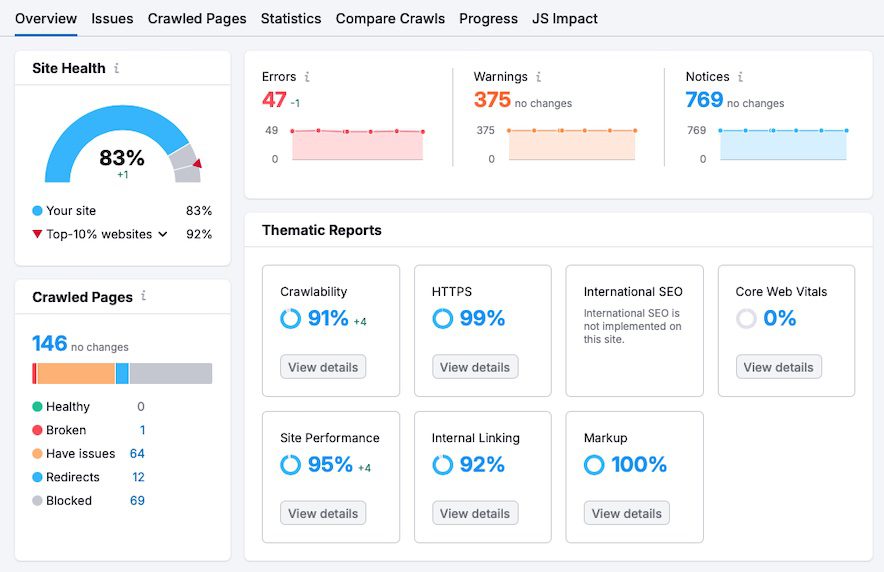Uncover the Hidden Website Pitfalls Sabotaging Your Visibility and Conversions
In an increasingly competitive market, every business competes to attract the attention and engagement of potential customers. If you don’t optimize your website for search engines like Google, Bing, and AI or design it with user experience in mind, you risk losing leads and potential customers.
This is where the concept of a free website auditor comes into play—helping businesses quickly identify any hidden issues that may be affecting their online visibility. A thorough website audit can shed light on errors, highlight strengths, and map out actionable steps to improve your website’s performance and search engine rankings.
Many errors are hidden, often related to code and structure. Just because everything appears fine doesn’t guarantee it is without mistakes.
In this article, we’ll explore why it’s advisable to have a professional audit, what type of information a free website auditor typically provides, and how addressing identified problems can significantly increase your website’s organic search rankings.
We’ll also share a real‑life case study of a plumbing product company that collaborated with PX Media for a site overhaul. Finally, we’ll conclude with quick tips on what to watch out for to keep your site in good health and how satisfied clients can be after the audit process.
Why a Professional Audit is Worth It
Some website owners believe a quick look or a single online tool is enough to assess site health. While a simple scan is better than doing nothing, a professional audit is far more comprehensive. It examines technical elements, content strategy, link profiles, user experience, and additional factors that play a major role in search engine rankings. Most importantly, a professional audit won’t merely provide a list of issues; it explains why they matter and how they interrelate to affect your site’s overall performance.
1. Identifying Technical Problems
In the online world, even small glitches can create large setbacks. Pages may load slowly due to large images, broken internal links can frustrate site visitors, and redirect loops might hinder search engine crawlers. These technical SEO obstacles—such as incorrect canonical tags—can confuse search engines and lower your visibility.
A free website auditor helps uncover these problems before they cause lasting harm. By carefully exploring your site, the auditing tool and team can pinpoint everything from simple 404 errors to more complex performance issues. Quickly resolving them ensures your website remains accessible and user‑friendly for both site visitors and search engines.
2. Strengthening User Experience (UX)
User experience is a top priority in modern digital marketing. If your website lacks intuitive navigation or if the content is poorly organized, site visitors often leave. A professional audit looks at fundamental UX factors like site architecture, mobile responsiveness, readability, and speed. By improving these elements, you not only retain people longer but also encourage them to explore your products or services.
Search engines like Google also weigh UX heavily. They measure click‑through rates, time on the page, and bounce rates when evaluating your website ranking. In other words, a frustrating or slow website can undermine your position—even if you feature high-quality content.
3. Refining Content and SEO
Search engine optimization (SEO) centers on making each page easy to find for users and search engines.. Keyword usage, headings, and page SEO all matter. Poorly optimized web pages, duplicate content, or missing details can seriously hurt visibility.
A professional audit examines the material on each page, checks whether the titles and meta description tags align with best practices, and evaluates the placement of internal links. When creating content, it’s important to meet user expectations. Detailed product information, a relevant blog post, and organized navigation all work together to form strong SEO strategies that elevate your site’s chance to be ranked high in results.
4. Maximizing Conversion Potential
A website’s main goal is often to convert site visitors into leads or paying customers. A comprehensive audit can highlight the effectiveness of call-to-action (CTA) placement on landing pages, the simplicity of form completion, and whether your messaging convinces visitors to take the next step. Small adjustments—like shifting a button’s position or altering headline text—can yield measurable improvements.
What You Receive from a Website Audit
A free website audit (such as PX Media’s offering) typically produces a detailed report on factors crucial to site performance. While no two reports are identical, you’ll often see:
- Technical Overview: Broken links, 404 pages, speed metrics, and security checks (like SSL setup and mixed content).
- On-Page SEO Analysis: Evaluation of page titles, meta descriptions, headers (H1, H2, H3), keyword use, and page SEO elements.
- Mobile Responsiveness: Verification that your site displays and functions well on phones and tablets.
- Content Evaluation: Checks for thin or duplicate content, clarity, and relevance. Suggestions for reorganizing product pages or improving the topic structure.
- Backlink Profile: Identifies harmful incoming links and can recommend ways to secure higher‑value links.
- User Experience Insights: Looks at site architecture, layout, and overall usability to find friction points.
- Social Media and Conversion: Evaluate the effectiveness of your site’s social sharing integration and whether lead captures or sales funnels are optimized.
These findings serve as a roadmap, helping you improve and maintain a strong web presence. Essentially, a free website auditor offers the starting point for ongoing improvements that support higher search engine rankings.
A Plumbing Product Company’s Success Story
To show the impact of a professional audit, consider how PX Media helped a plumbing product company—specialists in manufacturing professional plumbing tools. Despite offering quality items, the company faced online visibility challenges and low conversions. They collaborated with PX Media for a thorough site assessment.
Initial Problems
- Low Search Presence: Even for relevant terms, the site rarely showed up in top results.
- Slow Load Times: Images, videos, and code can cause delays, and site visitors were abandoning the site prematurely.
- Unclear Content Organization: Information about the product was spread over various product pages with inconsistent formatting.
- Weak User Experience: Navigation confused prospective buyers, and they couldn’t easily compare different tool features.
- Few Calls‑to‑Action: Visitors who found the site weren’t guided to request specs or contact the sales team directly.
Audit Insights and Solutions
Technical Enhancements
PX Media started by running a free website auditor, uncovering broken internal links, missing alt tags, and mixed HTTP/HTTPS content. Proper redirects were introduced, images were compressed, and code was refined to improve load speed. These changes collectively boosted performance.
SEO and Content Optimization
The audit exposed holes in keyword usage. Terms related to professional plumbing tools were missing from headings and body copy. PX Media optimized these elements, reorganized items under clear categories, and added demonstration videos. When creating content, they also ensured each blog post or description matched user intent and engaged the target audience.
User Experience Redesign
Based on the findings, the site navigation was updated into a more straightforward format. A mega menu highlighted major tool categories, helping site visitors find items quickly. Customer reviews and official certifications appeared in prominent spots to encourage trust.
Optimized Calls‑to‑Action
Previously, the site relied on a generic contact page. PX Media strategically placed CTAs on landing pages and product pages, prompting readers to download tech sheets, inquire about products, or sign up for updates. This guided people through a clear buying path.
Notable Results in a Short Period
Within a few weeks, the plumbing tool manufacturer saw steady growth in organic traffic. Certain web pages began to be ranked high for key terms like “plumber tool supplier.” Faster speeds and better navigation decreased bounce rates, and site visitors spent more time exploring products or services.
Although search engine optimization can require several months for full effect, these early gains proved the practical value of a free website auditor and subsequent professional fixes. Over time, the company witnessed an uptick in inquiries and a stronger online presence—highlighting how a well‑executed audit can enhance visibility and website ranking.
The client appreciated the transparent, data‑driven process from PX Media. Ongoing support—including incremental updates—ensured new product lines were equally optimized. With analytics tools like Google Analytics and Google Search Console, PX Media continued refining SEO strategies for even more effective outcomes.
Quick Tips: Key Areas to Monitor
While a professional audit gives the most thorough insights, here are some quick checks to keep your website running smoothly:
Site Speed
Use tools like Google’s PageSpeed Insights or Google Search Console to identify sluggish areas. Compress images, enable caching, and minify code for faster delivery.
Meta Description
Each web page requires a relevant meta description. This helps searchers and can improve click‑through rates.
Check Broken Links
Regularly scan for 404 errors or redirects that go nowhere. Fixing these prevents confusion and maintains credibility.
Alt Text on Images
Use descriptive alt tags to enhance accessibility for disabled users and inform search engines.
Mobile Responsiveness
Ensure your design scales seamlessly on smartphones and tablets, which account for a significant share of traffic.
Streamlined Navigation
Keep menus straightforward. Let people access the right sections with minimal clicks.
Calls‑to‑Action
Place CTAs where readers naturally look. Encouraging an immediate step can lead to tangible conversions.
How PX Media Ensures Positive Outcomes
PX Media’s approach to auditing extends beyond automated reports. They interpret data in a business context—factoring in your industry, competition, and target audience—so suggestions can be prioritized effectively. After the initial assessment, the team offers continued support, updating tactics as algorithms or market conditions evolve.
For the plumbing product company, PX Media maintained open communication, providing progress updates and iterative enhancements. The client reported a noticeable increase in leads, along with an elevated online footprint. They attributed this success to the methodical, targeted approach that balanced technical fixes with strong page SEO and user‑focused refinements.
Final Thoughts: Take Advantage of a Free Website Auditor
Whether you run a small local shop, manage an eCommerce store, or represent a larger organization, it’s crucial to keep your website optimized. Even if your products or services excel, hidden issues can hold you back from better visibility.
A free website auditor reveals the core obstacles and offers an initial plan to tackle them. Teaming up with professionals who interpret that data and devise tailored actions truly influences website ranking, user satisfaction, and conversions.
If you want to see how your site stacks up, explore PX Media’s free website audit. Their focus goes beyond quick checks, delivering actionable insights on technical SEO, site speed, layout, and more. Regular auditing also supports adaptation to new market trends and search engine changes.
Start now and see how your business can benefit—just like the plumbing product company that gained significant traction through PX Media’s support. The earlier you recognize and fix issues, the sooner you’ll see improvements in traffic and credibility.


